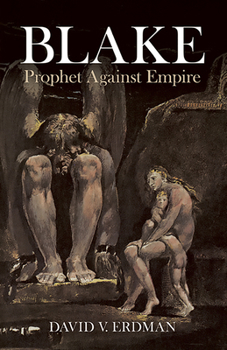Blake: Prophet Against Empire
Select Format
Select Condition 
Book Overview
"An unsurpassed account of the historical background -- literary, cultural, and intellectual as well as political and social--against which Blake worked and to which he responded as engraver, painter, and poet." -- English Language Notes.
For many years, William Blake was seen as a brilliant eccentric on the fringes of English literature and art. In the twentieth century, however, he came to be regarded as one of the greatest English...
Format:Paperback
Language:English
ISBN:0486267199
ISBN13:9780486267197
Release Date:November 2011
Publisher:Dover Publications
Length:624 Pages
Weight:1.43 lbs.
Dimensions:1.1" x 5.4" x 8.4"
Customer Reviews
1 rating
Not a two-term poet
Published by Thriftbooks.com User , 22 years ago
Blake wrote at a time which was seminal for thinkers of the nineteenth century, and BLAKE/PROPHET AGAINST EMPIRE by David V. Erdman attempts to put the views of Blake into his social and economic setting. The basic contrast between Eros and Thanatos, familiar to us from the late writings of Freud, "a brilliance now recognized by critics who speak of Blake as having anticipated `the whole of Freud's teaching' or Jung's charting of `psychic patterns,' " (p. 238), actually date back to the ancient Greek poet Empedocles, on whom Nietzsche lectured as a young college professor. "The life of sexuality is the best, the noblest, the greatest opposition against the drive for divisions. This is demonstrated most clearly in cooperation between the conflicting social classes for the sake of production. That which belongs together is torn apart at some point and desires to be together once again with itself. Love (philia) has the will to overcome the rule of strife: [Empedocles] calls her Philotes, Affection, Cyprus, Aphrodite, and Harmonia (. . .). Innermost to this drive is the search for equality: with inequality for everyone, Aversion arises; with equality for all, want. Nietzsche, THE PRE-PLATONIC PHILOSOPHERS (translated by Greg Whitlock, pp. 114-5).This book makes the point very clearly with respect to America. "To say that she wants to be loved, not raped, is to say, economically, that she wants to be cultivated by free men, not slaves or slave-drivers; for joy not for profit." (p. 210). "For `counting gold' is not abundant living; and grasping colonies and shedding blood whether in the name of royal dignity or in the name of commerce is not living at all, but killing." (p. 209). During the terror following the French Revolution, Blake was engraving from sketches showing "conditions of human servitude in the South American colony of Dutch Guiana during some early slave revolts" (p. 213) for a book by Captain J.G. Stedman on the years 1772 to 1777, but the book was not published until 1796. "We know he was working on them during the production of his `Visions of the Daughters of Albion' because he turned in most of the plates in batches dated December 1, 1792, and December 2, 1793." Stedman "was in love with a beautiful fifteen-year-old slave, Joanna," (p. 215) and married her, "But he was unable to purchase her freedom, . . . The captain's own Joanna, to prove the equality of her `soul' to `that of an European,' insisted on enduring the condition of slavery until she could purchase freedom with her own labor." (p. 215).Some details in this book are likely to make free people glad we have escaped so much, but most might fret that we are not actually being offered peace. "In William Blake's Paradise the intellectual lions and lambs will not actually lie down together but will roar and bleat at each other in an energetic comradeship ranging over all topics which the Human Imagination can conceive." (p. 449).






